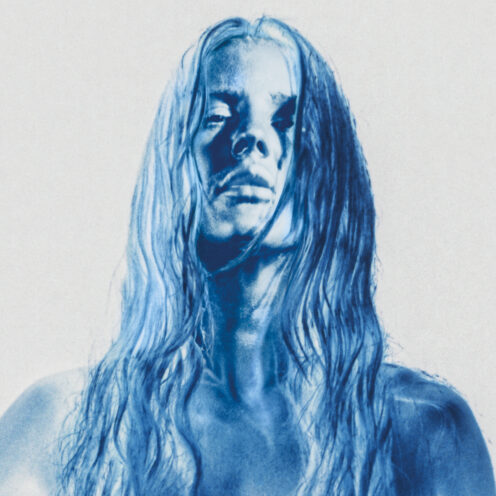
Brightest Blue is Ellie Goulding’s attempt to tell us exactly who she is.
In my preview of Brightest Blue through a review of EG.0, the accompanying EP (which she has since rightfully tacked “Sixteen” onto on streaming services), I wrote that “I sometimes think that Ellie Goulding didn’t know what to do with herself.” Over the next couple of days, interviews began to appear that supported this.
“I feel like I’ve never been able to explore who I am as a songwriter and as a pop artist. So that’s what [Brightest Blue] is,” she told London’s Evening Standard. In the Guardian, she talks of choosing Max Martin as a producer for 2015’s Delirium: “I need to commit to something. No one seems to know what I am. Maybe I don’t know who I am.”
The album begins with it’s longest song, aptly titled “Start,” which acts as the album’s thesis statement—“I’m thinking about how many times I’ve had to recover. All I do is start again. I’m thinking about a new beginning. It’s never too late to start again.”
Further down the track list, she adds in “Woman”—a song alongside “Explosions” in her top tier of ballads—“I faced my fears until I made it here. Now I don’t know where to stand, but I know it’s not over. If I’m losing touch, if I love too much, I’ll just leave it up to chance. That’s just the woman I am.”
The proper album’s lead single, “Power,” is an earworm that grows over time. One of the themes of this album is processing the experiences of toxic masculinity in her relationships and her musical career. She explains in the above Guardian interview how the music video is a capturing back of her sexuality after it had been turned into a tool and a weapon against her by the music industry.
“It wasn’t like I’d suddenly bloomed and become this sexual thing; I’d always been that. But there’s a difference between being it because you felt that you had to be, and then being it because you truly feel it and you can embrace it.”
In many ways, we have witnessed this transformation in many pop acts over the last decade. Beyonce’s self-titled and Lemonade both show a woman embracing all aspects of herself as parts of what make her powerful. Taylor Swift, with a little less conviction that Bey, has also embodied this as she’s aged.
“How Deep is Too Deep” is Ellie at her moody, electronically-influenced best. This song is the perfect embodiment of what a mature progression of 2012’s Halcyon would sound like. I’ve woken up with the chorus in my head for a week now. She’s the most confident she’s ever been in her voice while singing on Blue, and this song is a highlight.
The album contains three short interludes—“Cyan,” “Ode to Myself,” and “Wine Drunk”—that work to bridge complementary tracks. However, despite being perfectly fine in a vacuum, they create a false-feeling of length that really hurts the flow and pacing of this album.
Album standout “Love I’m Given” really drives home just how much Ellie has grown as a lyricist. It’s a song about recognizing worth, past indiscretions, and growth. “But I feel a change in the love I’m given. I’m turning the page now, am I forgiven?” she asks, and it resonates with the feeling of growing up and looking back on your teens and twenties and all the mistakes, hopes, and failures they are filled with.
“New Heights” is a lovely song, and probably what I would argue should’ve been the album closer as it’s lost in it’s current placement. The album resonates with her journey to self-acceptance in the closing lyrics, “Reaching these new heights, love without someone else feels right. Love for myself in the new light. There’s something much deeper inside.”
“Tides” is the closest thing to what could be found on Delirium, and the weakest song on this album and EP. “Bleach” is another fine song in a vacuum, but in the homogeneity of this album it tends to get docked points simply because it comes later in the album.
In 2018, Ellie released “Flux” and I remember thinking that it was something special, but not sure how it would fit into whatever comes next given what Delirium had been. I’ve never been so happy to be wrong. This album almost feels made to make “Flux” standout.
In many ways, this album already feels like dated story-telling for Ellie. She’s been working on these songs since late 2017, so they are very much an encapsulation of the experiences she was having three years ago. Since then, she’s gone on to fall in love and get married. So while the songs are mostly about the empowerment of self and being content alone, she’s yet to begin to explore her marriage in songwriting truly. Album closer, “Brightest Blue,” even addresses this as the only song about husband Caspar Jopling. “Yeah, I love me more than you, doesn’t mean I can’t be true.”
At the end of Brightest Blue, we now know who Ellie Goulding thinks she is. As a longtime fan, I am ecstatic to meet the real her. I won’t lie and say that this album lived up to my expectations. I wanted more out of it. But the more time I’ve spent with it, the more I’ve come to appreciate her candid nature about what this album is supposed to be. Turning thirty is hard enough, but I cannot imagine how much more difficult it is to do so in the public eye.
No matter what, I’ll be forever grateful for Ellie’s music—and the new songs I’ve found here and continue to enjoy more with every listen—and I can’t wait to see what comes next now that she knows who she is.
 Love I'm Given
Love I'm Given